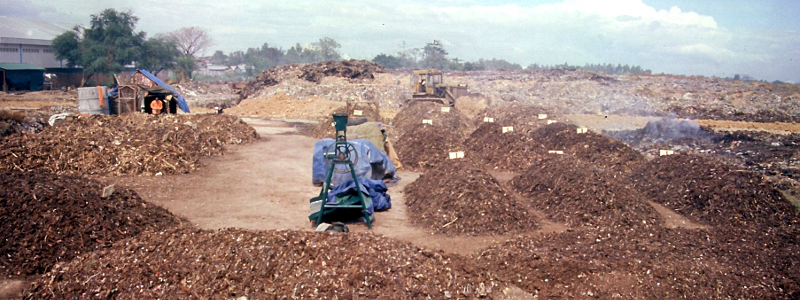Analysis and optimisation for the operational scheme and compiling a handbook with guidelines of the pilot composting plant Stung Mean Chey in Phnom Penh (Cambodia)
Author: C. Heller
Abstract
At the end of 2000, a pilot composting plant for the treatment of biodegradable market waste was built at the city landfill site in the capital of Cambodia, Phnom Penh. Thus, the composting start-up phase was launched. The existing pilot plant will be gradually adjusted to an operational phase. In the long run, it will be established as an economically sustainable composting plant and will be integrated into the waste disposal system of Phnom Penh. The following diploma thesis will describe the socio-economical and socio-cultural framework conditions for the operation of a composting plant in Cambodia and will analyse the resulting requirements for its operational management. Herewith, the focus is set on the agricultural situation, in particular, and on the local conditions for the compost utilisation and marketing. Furthermore, the operational requirements and the separate operational stages for the composting pilot plant will be analysed and evaluated according to their problematic potential. On the basis of those results, modification and optimisation approaches for the operational scheme at the plant will be developed and integrated into the practice. A handbook with guidelines will be compiled in order to assure the professional running of the composting plant. It will enable the Cambodian project co-workers to operate the plant independently and to be able to react adequately to problematic situation. At the end, the operational cost of the plant will be calculated and an economical analysis for the operation of a composting plant will be carried out.
Analyse und Optimierung des Betriebsablaufes und Erstellung eines Betriebshandbuches für die Pilot-Kompostierungsanlage Stung Mean Chey in Phnom Penh (Kambodscha)
Author: C. Heller
Abstract
In der Hauptstadt Kambodschas, Phnom Penh, wurde zum Jahresende 2000 eine Pilot-Kompostierungsanlage zur Behandlung biogener Marktabfälle auf der städtischen Mülldeponie errichtet und die Anlaufphase der Kompostierung gestartet. Die bestehende Pilot-Anlage soll in die Betriebsphase überführt und längerfristig als eine wirtschaftlich selbständig arbeitende Kompostierungsanlage in das Abfallentsorgungssystem der Stadt Phnom Penh integriert werden. In dieser Arbeit sind die sozioökonomischen und soziokulturellen Rahmenbedingungen für den Betrieb einer Kompostierungsanlage in Kambodscha dargestellt und die hieraus resultierenden Anforderungen an die Betriebsführung herausgearbeitet. Hierbei wird besonders auf die landwirtschaftliche Situation sowie die örtlichen Bedingungen für die Kompostanwendung und Vermarktung eingegangen. Zudem werden die Betriebsvoraussetzungen und die einzelnen Verfahrensstufen der Pilotkompostierungsanlage wissenschaftlich analysiert und hinsichtlich des Problempotentials beurteilt. Anhand dieser Erkenntnisse werden Modifizierungs- und Optimierungsansätze für den Betriebsablauf auf der Pilotanlage entwickelt und in den Praxisbetrieb integriert. Zum fachkundigen Betreiben der Kompostierungsanlage wird ein Betriebshandbuch mit Handlungsanleitungen erstellt, welches die kambodschanischen Projektbetreiber in die Lage versetzt, die Anlage selbständig führen und auf Problemsituationen reagieren zu können. Abschließend werden die Betriebskosten der Pilotanlage kalkuliert und Wirtschaftlichkeitsbetrachtungen für den Betrieb einer Kompostierungsanlage in Phnom Penh angestellt.
Download
Anhang C - Betriebsanweisung (deutsch | 0,2 MB)
Anhang C - Betriebsordnung (deutsch | 0,2 MB)
Anhang C - Betriebstagebuch (deutsch | 0,3 MB)
Anhang C - Verfahrensanweisung (deutsch | 0,4 MB)
Anhang E - Bilder (deutsch | 3,7 MB)


